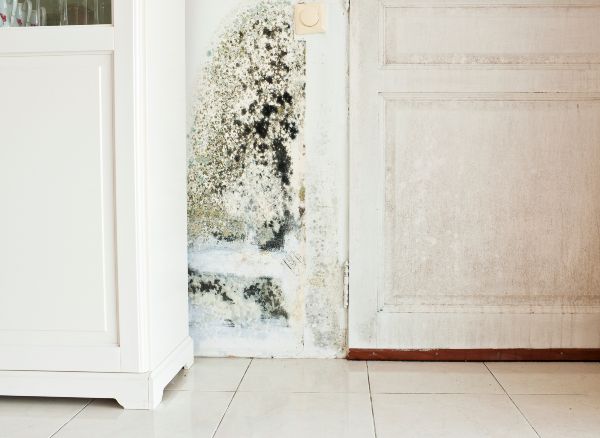How to Spot The 4 Main Signs of Mold

As moisture begins to form without proper drainage or ventilation, mold can begin to grow within a couple of days. The longer mold goes untreated, the more it will grow and damage the structure and your overall health. Look for early signs of mold.
Mold reproduces through air-born spores. Spores are so small that there may be thousands in just one cubic foot of air. If these spores find a moist or damp surface, they will latch on and start to grow.
Byproducts of mold include irritants, allergens, and even toxic substances, which is why mold causes an allergic reaction in so many people. Furthermore, for people already suffering from illnesses that affect breathing, like asthma, mold can greatly increase the severity of their symptoms.
If mold is developing in your home or business, it is important to catch it early and remediate immediately.
Discoloration of the Impacted Area
You might be wondering what mold looks like. Well, mold actually has a variety of appearances. For example, some molds grow what looks like fuzz or fur, which is usually white but can be other colors. You might have seen this growing on food like old fruit or bread.
Some other forms of mold may simply look like specks on a surface. Walls, corners in bathrooms and kitchens, and trim around windows are common places for mold to grow. New specks in these places may be far more than dirt.
Mold can make a surface appear stained. For example, the stain may be black but may also be brown, green, orange, or white. Additionally, mold could appear as a dark stain, like a shadow without other colors.
If you see something you suspect is mold, don’t wait. Have it checked out right away before it becomes an even bigger problem.
Musty Odor
A musty odor is one of the most common signs that gives mold away. You have probably smelled that damp, stale odor in an old basement. This type of odor is almost always produced by mold.
Mold smells because it produces microbial volatile organic compounds (mVOCs). mVOCs can include benzenes, ethanol, ketones, sulfur, and nitrogen compounds.
All of these substances put off a pungent odor. The smell of mold may change over time because which substances produced during growth can vary due to the type and age of the mold.
Fungus Near Affected Area
Mold is a type of fungus. So are mushrooms. There are actually four types, but the conditions fungus thrives in are the same for each kind of fungus. This means if you find fungus growing, there is likely to be mold because the same conditions support it.
Fungus, including mold, needs a damp area with an oxygen supply to continue to grow and reproduce, which is why mold is so common after experiencing water damage.
Cough or Sneezing
Mold can cause an allergic reaction and worsen the symptoms of breathing-related illness. Therefore, if you see other signs of it, like fungus, a musty smell, or discoloration, and you are experiencing breathing problems, it is highly likely that you have a mold problem in your home.
Have you noticed an increase in coughing, sneezing, and other allergies, or have a worsening of an existing breathing problem with no medical explanation? In that case, mold is high on the list of likely culprits.
How Do You Respond to Water Damage Fast?
If you have water damage from broken pipes, a flood, or something else, as soon as the water is stopped, clean-up should begin. Follow these steps to respond quickly to water damage.
- Remove any standing water. This can be accomplished in many ways, depending on the situation. For example, the water may be drained, scooped, or suctioned away.
- Dry the area completely. Leave the area open with plenty of room for the movement of air. In some situations, this may take an extended period.
- Repair any damage if necessary.
Prevent Mold in Your Home
Mold can do much damage when left unchecked to your health and home. If you see signs of mold, you must treat the problem immediately.
While there are several methods you can utilize to mitigate the issue and treat problems in your home over the short term, if you notice a mold problem developing in your home or other space, you may want to reach out to professionals for help.

